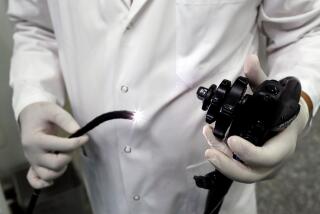Prostate tests may not aid survival
- Share via
Men screened for prostate cancer through blood tests or digital examinations die of the disease at about the same rate as those who were not checked, researchers have found.
“This study suggests that screening was not effective,” said John Concato, a doctor at the Yale School of Medicine who led the study. “Unfortunately, screening tests can sometimes find cancer, even at early stages, but not prolong survival.”
Prostate cancer is the second leading cause of cancer deaths in American men after lung cancer. Doctors check for it with a digital exam of the small gland and by measuring the level of a protein called prostate-specific antigen in the blood.
Concato’s study, published in the Jan. 9 issue of Archives of Internal Medicine, was based on the medical records of 1,000 men age 50 or older who had received care at veterans hospitals in New England, half of whom had died of prostate cancer.
It found the rate of PSA tests among the deceased was about the same as for the rest of the men who were still alive. A second analysis involving PSA tests and/or digital exams produced similar results.
Waking up is also hard for your brain
If it takes a while to clear the cobwebs after waking up, that’s understandable -- “sleep inertia” leaves some people so groggy they might as well have over-imbibed.
“For a short period, at least, the effects of sleep inertia may be as bad as or worse than being legally drunk,” said researcher Kenneth Wright of the University of Colorado at Boulder.
That befuddled feeling usually lasts for at least a few minutes but may be detectable for up to two hours, Wright wrote in a report published in the Jan. 11 issue of the Journal of the American Medical Assn.
Wright’s study of 16 subjects found the most severe impairments were evident on performance tests taken during the first three minutes after awakening from an eight-hour sleep.
“We found the cognitive skills of test subjects were worse upon awakening than after extended sleep deprivation,” he said.
Plant protein may cut blood pressure
People who get their dietary protein from vegetables rather than meat have lower blood pressure -- and the more plant protein consumed the better, a new study has found.
Most adults either have high blood pressure or are headed in that direction, according to researchers at Imperial College London. But the study of nearly 4,700 people from the United Kingdom, the United States, Japan and China found that the more vegetable protein the subjects said they consumed, the lower their blood pressure.
Previous research had concluded that a vegetarian diet was healthier for the heart than diets heavy in meat, and study author Paul Elliott said he found that the more plant protein people consumed, the lower their blood pressure.
The report published in the Jan. 9 issue of the Archives of Internal Medicine suggested that vegetarians tend to weigh less. It also said that the amino acids and magnesium found in vegetable protein may play roles in lowering blood pressure.





